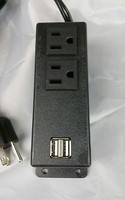Info
Alle Bewertungen (2.139)
- cj2cowen (1371)- Bewertung vom Käufer.Letzter MonatBestätigter KaufGood buyer, prompt payment, valued customer, highly recommended.
- mediabeast (945)- Bewertung vom Käufer.Letzter MonatBestätigter KaufHope to deal with you again. Thank you.
- second.sale (4933011)- Bewertung vom Käufer.Letzte 6 MonateBestätigter KaufGreat communication. A pleasure to do business with.
- dvdjunkie06 (3794)- Bewertung vom Käufer.Letzte 6 MonateBestätigter KaufQuick response and fast payment. Perfect! THANKS!!
- stalighter (13010)- Bewertung vom Käufer.Letzte 6 MonateBestätigter KaufThank you for an easy, pleasant transaction. Excellent buyer. A++++++.
- afigu (4981)- Bewertung vom Käufer.Letzte 6 MonateBestätigter KaufHope to deal with you again. Thanks!
Rezensionen (5)

26. Feb 2020
Great USB Charger
Excellent for charging my USB devices.

10. Jul 2020
Perfect for pulling clothes out of the dryer
My girlfriend loves using this for pulling clothes out the back of the dryer.
03. Mär 2012
Canned Heat’s Commercial Breakthrough
Canned Heat was formed in Los Angeles in 1965 by two record collectors and blues enthusiasts: Bob "The Bear" Hite, and Alan "Blind Owl" Wilson. Their vision was to pay tribute to traditional blues music while updating the sound and arrangements for contemporary rock audiences of the 60s. Their eponymous debut was released in 1967 three weeks after they performed at the Monterey Pop Festival. It included Henry "Sunflower" Vestine on lead guitar, and Larry "The Mole" Taylor on bass. By the end of 1967, Fito de la Parra joined the group on drums and finalized their "classic" 60s lineup. "Boogie with Canned Heat" was released in January 1968 and established the band with the hippie ballroom audiences as the "kings of boogie." The album was made up primarily of originals including “Amphetamine Annie,” about a friend of the band who died from a drug overdose; “My Crime,” about the band’s 1967 drug bust in Denver, and Henry Vestine’s instrumental “Marie Laveau,” named for the Creole voodoo queen. Also on the album was the #16 hit “On The Road Again,” featuring a droning sitar and Alan Wilson’s haunting falsetto vocals. Other highlights include “World in a Jug,” and “Fried Hockey Boogie,” an 11-minute boogie based on a traditional blues rhythm previously used by John Lee Hooker in “Boogie Chillen” and Slim Harpo in “Shake Your Hips”. (In 1973, ZZ Top used the same boogie riff to open their song “La Grange.”) Overall, a great album by the band that put the boogie in the blues!
